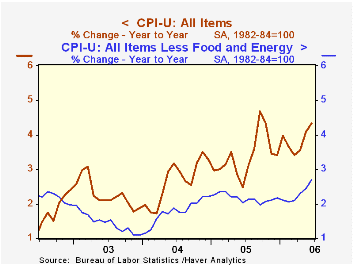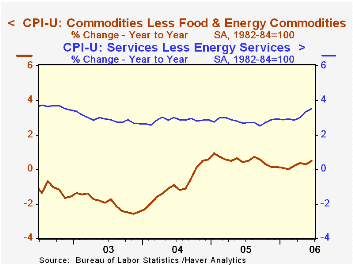 Global| Jul 19 2006
Global| Jul 19 2006Core CPI Firmer Than Expected
by:Tom Moeller
|in:Economy in Brief
Summary
Consumer prices (CPI-U) rose an expected 0.2% during June. The 0.3% rise in prices less food & energy was, however, like the previous month firmer than expectations for a 0.2% gain. The upside surprise in "core" price inflation [...]

Consumer prices (CPI-U) rose an expected 0.2% during June. The 0.3% rise in prices less food & energy was, however, like the previous month firmer than expectations for a 0.2% gain.
The upside surprise in "core" price inflation represented the fourth consecutive month of 0.3% gain. It pulled the y/y gain in prices to 2.7%, the fastest since mid-2001.
Core goods prices rose 0.1% for the third consecutive month. While the resulting 0.5% y/y increase is modest, and indeed below a high 0.9% gain in early 2005, the rise contrasts with outright price deflation from 2002 to 2004.
Furniture & bedding costs rose 0.3% (2.0% y/y) in June to produce the strongest y/y increase in ten years. Apparel prices were unchanged last month (0.6% y/y) but here again the y/y gain was the firmest in two years. Appliance prices fell 0.3% (+0.7% y/y) while new & used motor vehicle prices ticked up 0.1% (0.1% y/y). Tobacco prices jumped 0.8% (4.8% y/y) and medical care commodity prices fell 0.1% (3.9% y/y).
Core services prices rose 0.4% for the second consecutive month. Shelter prices again increased 0.4% (3.5% y/y) reflecting another strong 0.4% increase in the rental equivalence measure of owners' primary residences. The 3.6% y/y increase in this measure is the fastest since late 2002. Rents also increased 0.4% (3.5% y/y), an acceleration from the low of 2.5% in early 2004. Public transportation costs also have shown considerable strength and in June rose 1.2% to pull the y/y gain to 5.4%. Finally, education costs rose 0.5% for the fourth consecutive month (6.0% y/y) and medical care services prices rose 0.4% (4.2% y/y).
Food & beverage prices rose 0.3% helped by a 0.4% (0.4% y/y) rise in meat, fish & poultry prices. Fruit & vegetable prices soared 1.4% to lift the y/y increase to 4.0%.
Energy prices fell 0.9% due to a 1.0% decline in gasoline prices which has since reversed while natural gas & electricity prices fell 1.1% (+11.9% y/y).
The chained CPI, which adjusts for shifts in the mix of consumer purchases rose 0.3%. Less food & energy the increase in prices also was stable at 0.1%.
Is All That Talk Just Noise? from the Federal Reserve Bank of St. Louis is available here.
| Consumer Price Index | June | May | Y/Y | 2005 | 2004 | 2003 |
|---|---|---|---|---|---|---|
| Total | 0.2% | 0.4% | 4.3% | 3.4% | 2.7% | 2.3% |
| Total less Food & Energy | 0.3% | 0.3% | 2.7% | 2.2% | 1.8% | 1.5% |
| Goods less Food & Energy | 0.1% | 0.1% | 0.5% | 0.5% | -0.9% | -2.0% |
| Services less Energy | 0.4% | 0.4% | 3.5% | 2.8% | 2.8% | 2.9% |
| Energy | -0.9% | 2.4% | 23.2% | 16.9% | 10.8% | 12.2% |
| Food & Beverages | 0.3% | 0.2% | 2.3% | 2.4% | 3.4% | 2.1% |
| Chained CPI: Total (NSA) | 0.3% | 0.3% | 3.7% | 2.9% | 2.5% | 2.0% |
| Total less Food & Energy | 0.1% | 0.1% | 2.4% | 1.9% | 1.7% | 1.1% |
Tom Moeller
AuthorMore in Author Profile »Prior to joining Haver Analytics in 2000, Mr. Moeller worked as the Economist at Chancellor Capital Management from 1985 to 1999. There, he developed comprehensive economic forecasts and interpreted economic data for equity and fixed income portfolio managers. Also at Chancellor, Mr. Moeller worked as an equity analyst and was responsible for researching and rating companies in the economically sensitive automobile and housing industries for investment in Chancellor’s equity portfolio. Prior to joining Chancellor, Mr. Moeller was an Economist at Citibank from 1979 to 1984. He also analyzed pricing behavior in the metals industry for the Council on Wage and Price Stability in Washington, D.C. In 1999, Mr. Moeller received the award for most accurate forecast from the Forecasters' Club of New York. From 1990 to 1992 he was President of the New York Association for Business Economists. Mr. Moeller earned an M.B.A. in Finance from Fordham University, where he graduated in 1987. He holds a Bachelor of Arts in Economics from George Washington University.
More Economy in Brief
 Global| Feb 05 2026
Global| Feb 05 2026Charts of the Week: Balanced Policy, Resilient Data and AI Narratives
by:Andrew Cates






